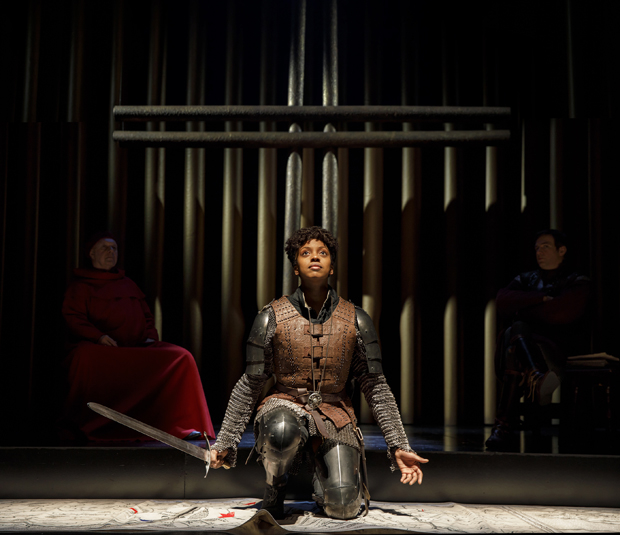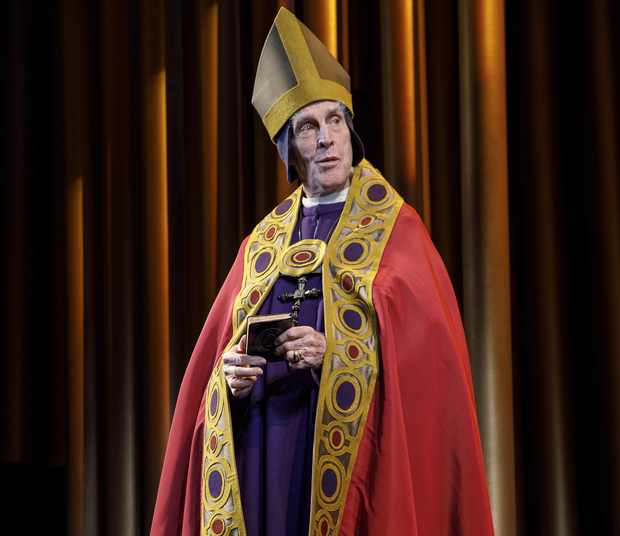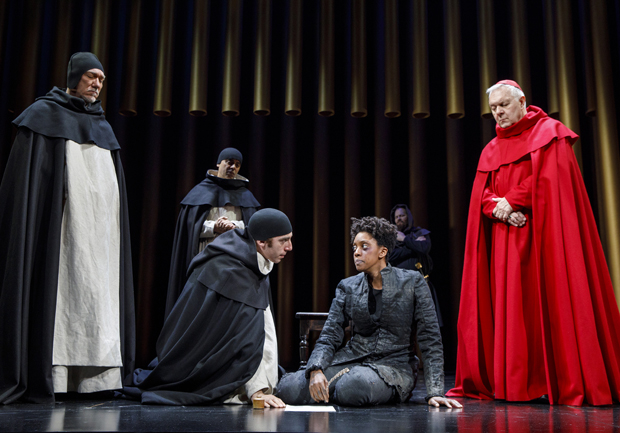Saint Joan and the Invention of the Nation

(© Joan Marcus)
Joan of Arc's strategy for retaking France was twofold: Move fast and break things. Like Charlemagne before her and Napoleon after, she was a disrupter, prepared to take down any antiquated system that stood between her and her vision. Her story is incredibly relevant to today, when disruption and its discontents are once again on a collision course. So why is the Broadway revival of George Bernard Shaw's drama, Saint Joan, so very boring?
It has nothing to do with the thrilling story: It's 1429 and the English have waged an expansionist war against the French for nearly a century. Joan (Condola Rashad), an illiterate teenager from Lorraine, thinks she can put a stop to it. The voices of Saint Catherine, Saint Margaret, and the archangel Michael have instructed her to lift the siege of Orléans and crown the Dauphin (Adam Chanler-Berat) at Rheims. Using her remarkable powers of persuasion, she takes command of the French army and succeeds. From there, she knows she can drive the English back across the channel. The Earl of Warwick (Jack Davenport) is distressed by her appeals to the French nation, not because he's English, but because he's an earl: Once common people shift their loyalty directly to king and country, what use will they have for nobles like him? The Bishop of Beauvais (Walter Bobbie) is similarly disturbed by her claim to direct communication with the saints, cutting out the clerical middleman. These elites determine to use their laws and traditions to make Joan submit, but Joan refuses: She knows that God is on her side.
A religious fanatic and proto-nationalist, Joan is an uncomfortable heroine for 2018, as she was in 1924 when the play premiered. Shaw describes her in his preface as "one of the first apostles of nationalism," and this was shortly after millions had died in the trenches of Europe for this ideology. When Joan insists that the foreigners must leave France and "go back to the country [God] made for them," she sounds like a medieval Marine Le Pen. This is true even though director Daniel Sullivan has excised some of Joan's more explicitly nativist language (the uncut play runs three-and-a-half hours, but this trimmed version comes in just under three — even though it feels significantly longer).
Casting a very talented black actor in the title role presents the opportunity to rediscover Joan as a freedom fighter against oppressive English colonizers, and how her crusade to expel these occupiers does not actually clash with her nativism. Unfortunately, Sullivan avoids such potentially dangerous perspectives in favor of no perspective, resulting in a production that feels both excessive and limp.

(© Joan Marcus)
That dichotomy is most apparent in Jane Greenwood's costumes, which look shockingly cheap and synthetic for a medieval royal court. One might justify this as a purposeful DIY aesthetic, but then what do we make of the authentic-looking plate armor and chain mail worn by some of the actors? Scott Pask's set, seemingly meant to look like the inside a pipe organ, looks more like an ugly golden wind chime. It pushes the actors downstage while adding little to the stage picture. The strange mixture of Bill Frisell's modern original music and sound designer Obadiah Eaves monk chant results in cacophony rather than clever synthesis.
The performances fare a bit better: Davenport delivers a wickedly blasé Earl of Warwick: "But you do burn people occasionally," he asks the bishop, like a London banker inquiring about a dry cleaning service. The effortlessly whiny Chanler-Berat fits excellently in the role of the ineffectual Dauphin. The play even gets a bit more exciting in the second act thanks to a chilling opening statement by Patrick Page as the Inquisitor (after hearing his direct appeal, members of the audience are apt to take the church's side).
Rashad's performance is likely to be the one most remembered from this revival: She speaks her lines with the singsongy sweetness of a child while wearing the wide eyes of a true believer and the toothy smile of a televangelist. In a more courageous production, she would easily be the most terrifying villain of the season. As it is, she remains a somewhat mythic heroine, as cold and unapproachable as any saintly statue on a pedestal wagging her two fingers at us from across time.

(© Joan Marcus)
All of this is disappointing because Sullivan's work is usually marked by lucid design and revelatory performances. No director is better at transporting a Shakespeare play to an unlikely time and place in order to reveal the durability of the plot and universality of the themes. Saint Joan might have benefited from such a radical treatment. Instead, we get a conservative, somewhat whitewashed revival. Joan of Arc's name will reverberate through history long after all of us are dead, but this Saint Joan is destined to be instantly forgotten.










